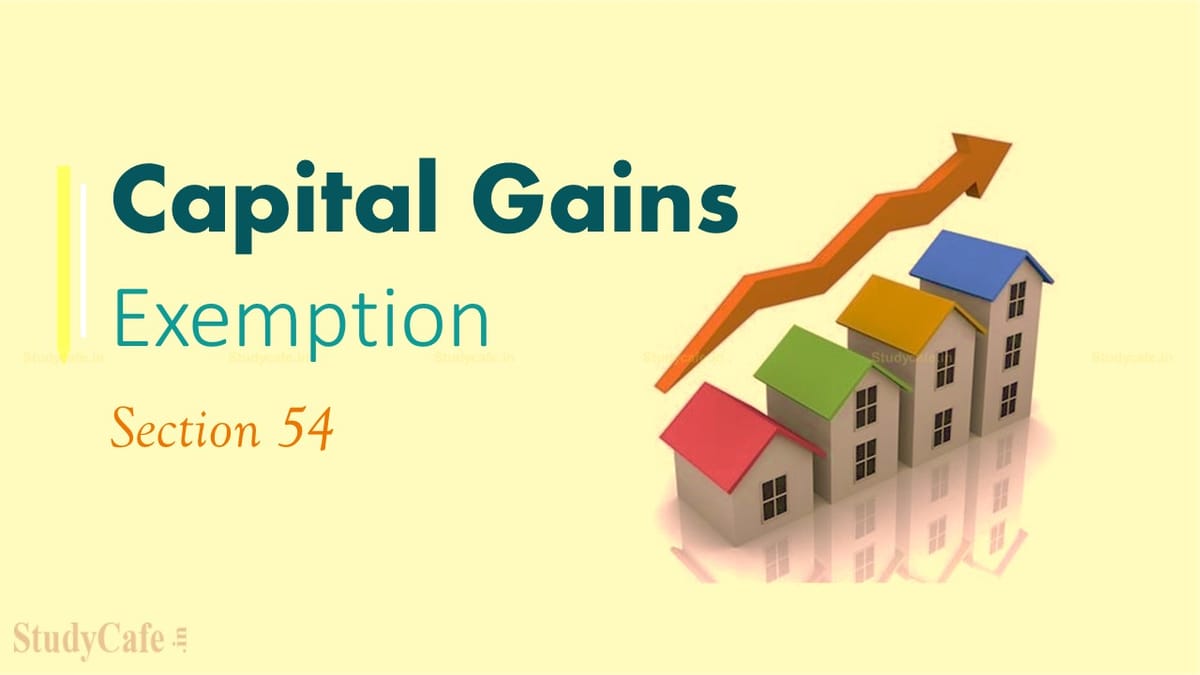All About Section 54 and Capital Gains Account Scheme
Deepshikha | May 18, 2022 |

All About Section 54 and Capital Gains Account Scheme
Section 54 provides that any long-term capital gain resulting to an individual or a HUF from the sale of a residential property (whether self-occupied or rented) is exempt to the degree that the capital gain is invested in the:
Provided that the new Residential House Property purchased or constructed is not transferred within 3 years from the date of acquisition. If the new property is sold within three years of its acquisition, the cost of acquisition of this home property is reduced by the amount of capital gain excluded under section 54 previously to compute capital gains on this transfer. This transfer will always result in a short-term capital gain.
Capital gains are excluded to the degree that they are used to acquire and/or construct a new home, i.e.
The Capital Gains Exemption is only available if the funds are used to build or acquire a single residential home [introduced by Finance Act 2014]. If a person invests his capital gain in the construction or acquisition of a single residential house, he can claim capital gains exemption regardless of how many properties he already owns.
The capital gains exemption would be allowed even if the investment was made in the purchase/construction of two residential dwellings, as an exception to the preceding regulation. This exemption for buying two residential houses, however, can only be used once. This exemption, once claimed, cannot be used in any subsequent years. For the remaining years, only one residential house should be constructed or purchased [Introduced under the Finance Act 2019].
To reiterate, the number of residences previously owned by a person is irrelevant for claiming exemption under Section 54. He can still claim the exemption by reinvesting the capital gains from the sale of his home in another residential property.
Although the assessee has two years to purchase or three years to construct a house property under Section 54, the capital gains on the transfer of the original house property are taxable in the year in which it is sold. The relevant assessment year’s Income Tax Return must be filed on or before the stipulated due date for filing the Income Tax Return for that year. As a result, the assessee must decide on the acquisition or building of the house property before filing the income tax return; otherwise, the capital gain will be taxed.
The Income Tax Act gives an alternative in the form of a deposit under the Capital Gains Account Scheme to avoid the foregoing circumstance.
The amount of capital gain that the Assessee does not utilise for the purchase or construction of a new house before the due date for filing the Income Tax Return shall be put in the Capital Gains Account Scheme before the required date for filing the return. When claiming the Capital Gains Exemption, the facts of the deposit, such as the Date of Deposit and the amount placed, must be included in the Income Tax Return. The amount previously spent by the assessee on the purchase/construction of the new home will be eligible for exemption in this situation.
If an assessee deposits money in the Capital Gains Account Scheme but does not use it for the purchase or construction of a residential house within the specified time, the money will be charged as Capital Gains in the year in which the three years from the date of sale of the Original Asset is completed, and it will be a long-term capital gain for that financial year.
The DDA’s allocation of a flat under the Self-Financing Scheme is treated as house construction (Circular No. 471, dated 15-10-1986). Similarly, allocation of a flat or a house by a co-operative society to which the assessee belongs is treated as house construction (Circular No. 672, dated 16-12-1983). Additionally, even if the work is not completed within the statutory time limit, the assessee is allowed to claim capital gains exemption [Shashi Verma v CIT (1997) 224 ITR 106 (MP)].
The Delhi High Court used the same analogy in CIT v R.L. Sood (2000) 108 Taxman 227 (Del), where the assessee made a substantial payment within the prescribed time limit and thus acquired substantial domain over the property, despite the builder failing to hand over possession within the stipulated time.
In case of any Doubt regarding Membership you can mail us at contact@studycafe.in
Join Studycafe's WhatsApp Group or Telegram Channel for Latest Updates on Government Job, Sarkari Naukri, Private Jobs, Income Tax, GST, Companies Act, Judgements and CA, CS, ICWA, and MUCH MORE!"